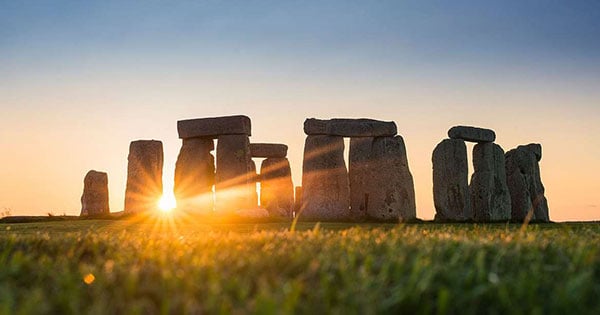Does it say human remains or not ?Yeah, but they're proto-human and have no dna record in the current population so become irrelevant to the discussion really.
Stick to the point.
You are using an out of date browser. It may not display this or other websites correctly.
You should upgrade or use an alternative browser.
You should upgrade or use an alternative browser.
Migrants
- Thread starter lastmuffininbrussels
- Start date
Someone's got their dates mixed up:
An Introduction to Prehistoric England
Prehistory is the time before written records. It's the period of human history we know the least about, but it's also the longest by far.www.english-heritage.org.uk
The earliest known humans arrived in these lands around 900,000 years ago.

An Introduction to Prehistoric England
Prehistory is the time before written records. It's the period of human history we know the least about, but it's also the longest by far.
www.english-heritage.org.uk
Modern humans, Homo sapiens
Our own species is a relative newcomer to Britain. The earliest direct evidence is a jaw fragment found in Kent's Cavern, Devon. Scientific analysis estimated it to be at least 40,000 years old.For thousands of years the presence of modern humans in Britain remained brief and sporadic. It has only been continuous since about 12,000 years ago.
The modern humans who appeared in Britain were highly adaptable hunter-gatherers. Their ability to innovate was different from all preceding species. They lived in larger groups, had wider social networks and moved over larger distances.
This extended interaction led to the sharing of stories and information, including the spread of new ideas and knowledge.
.
First Britons | Natural History Museum
Unearth the one-million-year story of humans in Britain and their struggle to survive in a changing land.
They were Neanderthals. But they were from about 400,000 years ago.Does it say human remains or not ?
proving my earlier point. ThanksModern humans, Homo sapiens
Our own species is a relative newcomer to Britain. The earliest direct evidence is a jaw fragment found in Kent's Cavern, Devon. Scientific analysis estimated it to be at least 40,000 years old.
For thousands of years the presence of modern humans in Britain remained brief and sporadic. It has only been continuous since about 12,000 years ago.
The modern humans who appeared in Britain were highly adaptable hunter-gatherers. Their ability to innovate was different from all preceding species. They lived in larger groups, had wider social networks and moved over larger distances.
This extended interaction led to the sharing of stories and information, including the spread of new ideas and knowledge.
.
First Britons | Natural History Museum
Unearth the one-million-year story of humans in Britain and their struggle to survive in a changing land.www.nhm.ac.uk
not proved your point at all you said cheddar man 10000 years agoproving my earlier point. Thanks
really try reading the natural history linkThey were Neanderthals. But they were from about 400,000 years ago.
As OddsBodkin says, any 'human' remains or evidence that predates about 60,000 years ago is irrelevant because Britain was a deserted island from about 180,000 years until about 60,000 years ago.Yeah, but they're proto-human and have no dna record in the current population so become irrelevant to the discussion really.
Stick to the point.
Then the 'indigenous' Neanderthals and the 'migrant' Homo Sapiens interbred.
The Neanderthals became extinct. Just the 'migrant' homo sapiens remained.
I’m was at Stonehenge last week and the whitewashing was amazing. The displays they had were all white. It’s been common knowledge that the builders of Stonehenge have been genetically linked to what is modern day Turkey.
Britain became an island around 8,000 years ago after a huge tsunami swamped Doggerland and became the North Sea, an area Chedder Man may well have crossed on his way here. I think they found about 20 or so people still living in the village shared dna but their lineage takes an indirect root and it's a stretch to say they're relatives.I’m was at Stonehenge last week and the whitewashing was amazing. The displays they had were all white. It’s been common knowledge that the builders of Stonehenge have been genetically linked to what is modern day Turkey.
Is Muffin re-telling the tale that the builders of Stonehenge were survivors from the Trojan War?
But perhaps i can circle back to modern migrants and suggest the influx of people from around the world can only strengthen the genetic pool for our survival? As global warming grows stronger, a darker skin pigmentation would be a benefit, no?
GBritain became an island around 8,000 years ago after a huge tsunami swamped Doggerland and became the North Sea, an area Chedder Man may well have crossed on his way here. I think they found about 20 or so people still living in the village shared dna but their lineage takes an indirect root and it's a stretch to say they're relatives.
Is Muffin re-telling the tale that the builders of Stonehenge were survivors from the Trojan War?
But perhaps i can circle back to modern migrants and suggest the influx of people from around the world can only strengthen the genetic pool for our survival? As global warming grows stronger, a darker skin pigmentation would be a benefit, no?
You want chille sauce with kebab my friendBritain became an island around 8,000 years ago after a huge tsunami swamped Doggerland and became the North Sea, an area Chedder Man may well have crossed on his way here. I think they found about 20 or so people still living in the village shared dna but their lineage takes an indirect root and it's a stretch to say they're relatives.
Is Muffin re-telling the tale that the builders of Stonehenge were survivors from the Trojan War?
But perhaps i can circle back to modern migrants and suggest the influx of people from around the world can only strengthen the genetic pool for our survival? As global warming grows stronger, a darker skin pigmentation would be a benefit, no?
Attachments
D
Deleted member 294929
Britain became an island around 8,000 years ago after a huge tsunami swamped Doggerland and became the North Sea, an area Chedder Man may well have crossed on his way here. I think they found about 20 or so people still living in the village shared dna but their lineage takes an indirect root and it's a stretch to say they're relatives.
Is Muffin re-telling the tale that the builders of Stonehenge were survivors from the Trojan War?
But perhaps i can circle back to modern migrants and suggest the influx of people from around the world can only strengthen the genetic pool for our survival? As global warming grows stronger, a darker skin pigmentation would be a benefit, no?
Cheddar man??????.. are you sure. . Sounds a bit Cheesey
Is that a GBNews reporter working from home? Hard to take that seriously when he's clearly getting a blowjob from a Muslim midget.
More like ReganAndCarter's neo-nazi friends.Is that a GBNews reporter working from home? Hard to take that seriously when he's clearly getting a blowjob from a Muslim midget.
Similar threads
- Replies
- 105
- Views
- 9K
- Replies
- 192
- Views
- 15K
- Replies
- 26
- Views
- 2K
- Replies
- 487
- Views
- 11K


